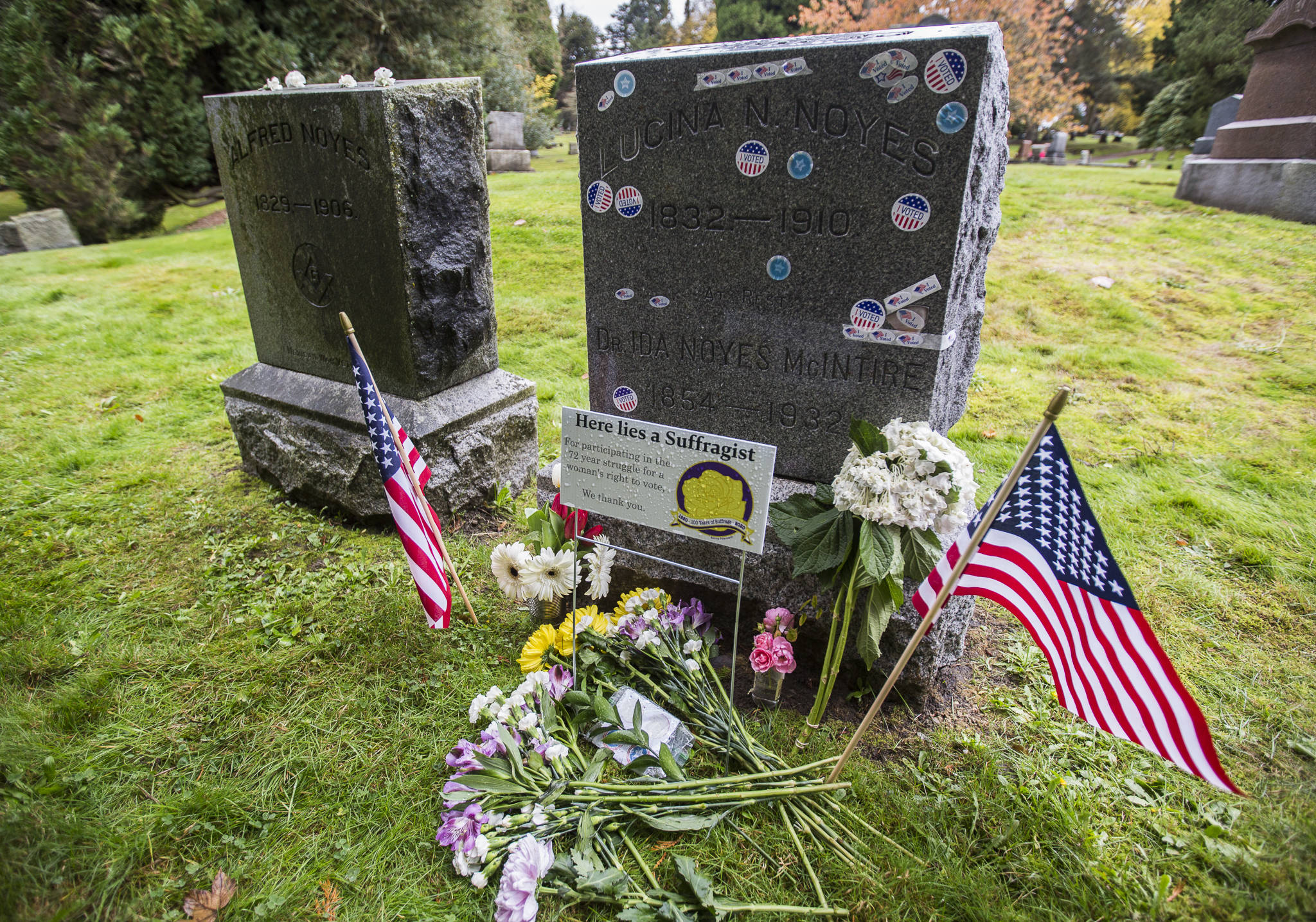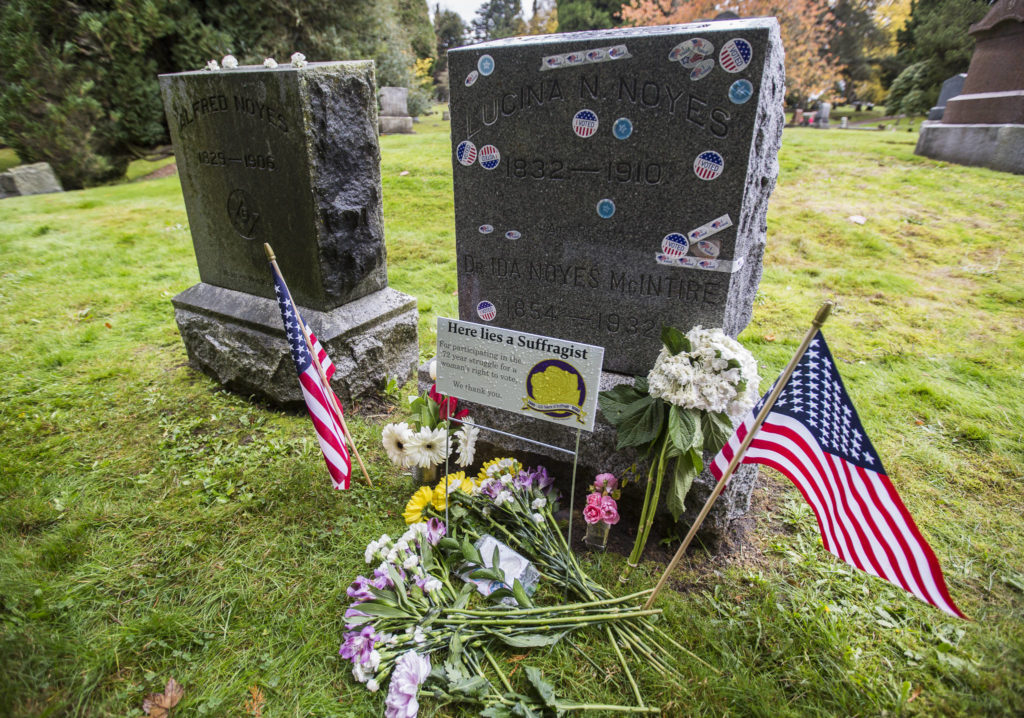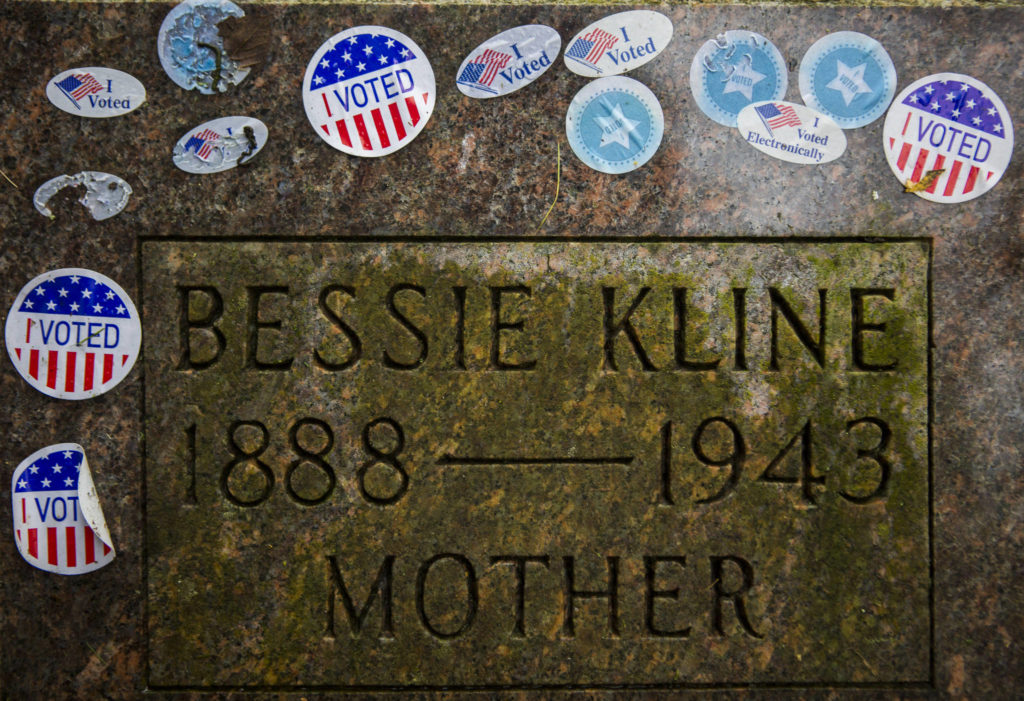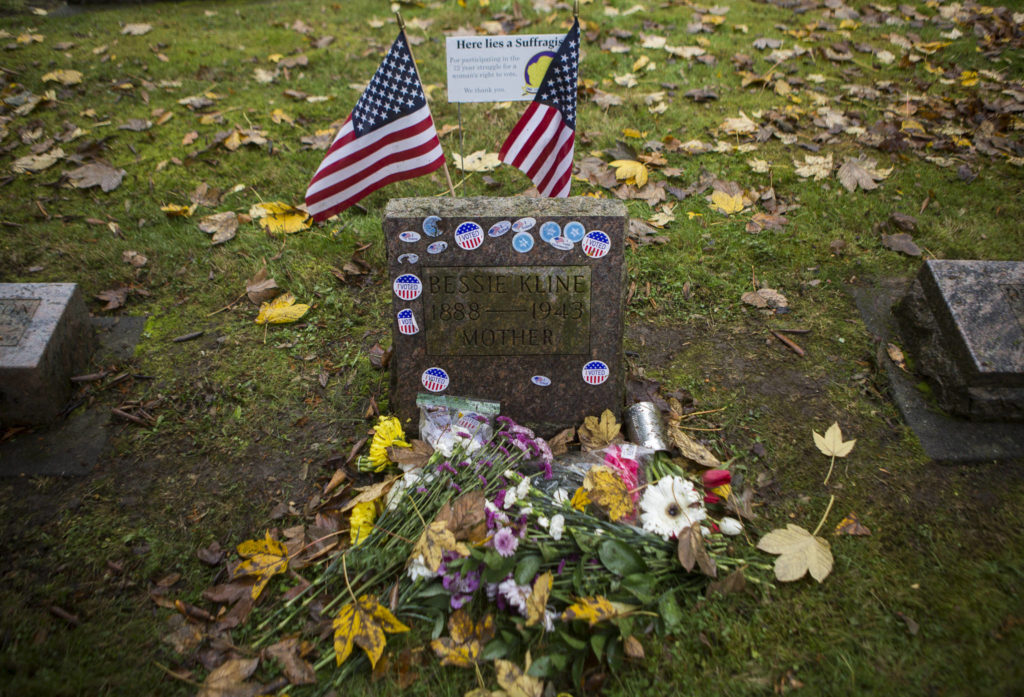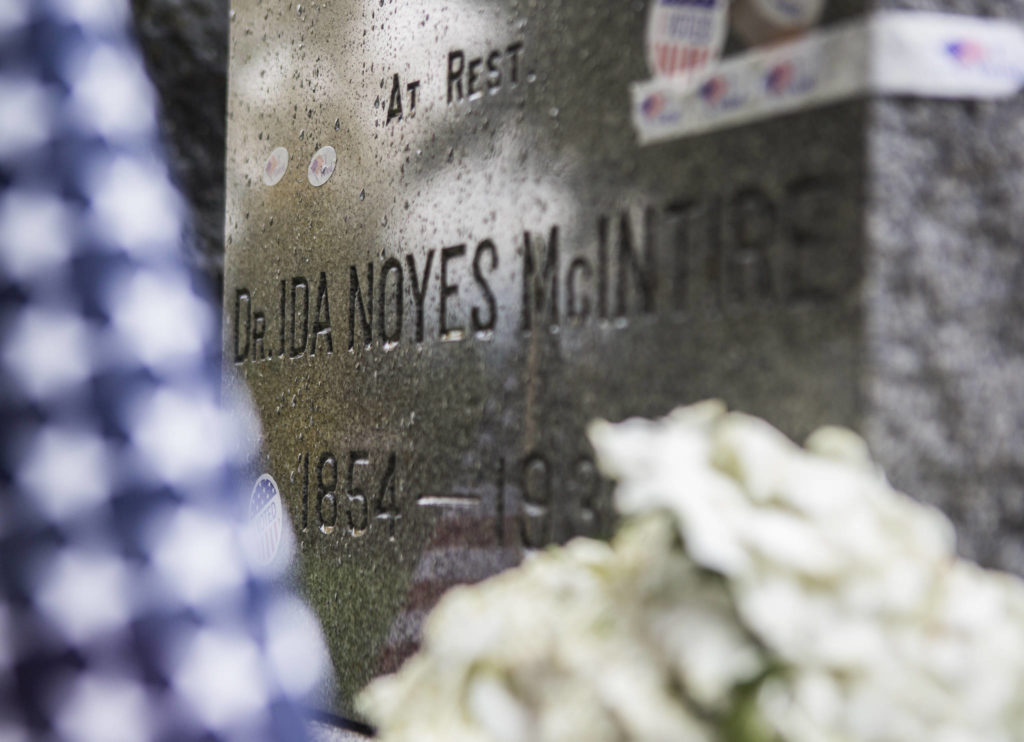Before Washington women gained the right to vote in 1910, Dr. Ida Noyes McIntire led meetings of the Everett Suffrage Club at her Colby Avenue medical clinic. On Tuesday, Election Day, her efforts were honored as visitors to her grave left touching reminders of a long, fierce struggle.
“I Voted” stickers, flowers, American flags and signs saying “Here Lies a Suffragist” were placed at two gravesites in Everett’s Evergreen Cemetery, where McIntire and Bessie Kline, another crusader for women’s voting rights, are buried. The tributes are part of a statewide effort, ThankHER2020, tied to the Washington State Historical Society’s Votes for Women Centennial.
Here, the Washington State Constitution was permanently amended to grant women the right to vote in 1910. But it wasn’t until 1919 that the U.S. Senate passed the 19th Amendment. Nationally, women won the constitutional right to vote in August 1920, after three-quarters of state legislatures had ratified the 19th Amendment.
“I’ve always been really passionate about voting,” said Starlyn Nackos, of Lake Stevens, who spearheaded the ThankHER2020 drive to place signs on the graves of Washington’s suffragists.
A list of 116 people recognized in our state — not all of them women — is available online. Using the “Find A Grave” website, the Washington State Historical Society has created a virtual cemetery. It was inspired by the National Women’s History Alliance “Here Lies a Suffragist” program, which started in Santa Rosa, California.
Nackos spent Election Day in Grays Harbor County with her four children, ages 3 to 11. They placed the signs at Fern Hill Cemetery in Aberdeen and at Montesano’s Wynoochee Cemetery. Since August, she has visited more than 60 grave sites in Western Washington and has learned about women statewide who joined in the struggle for voting rights.
“I wanted to draw more attention to suffrage,” said Nackos, 36. She first voted in a presidential election in 2004, George W. Bush vs. John Kerry. Last year, Nackos was teaching Washington history to seventh-graders. She worked at Everett’s Eisenhower Middle School as a replacement teacher for someone on leave. This school year, she’s home with her kids and involves them in the suffrage project.
At the Montesano cemetery, they placed a sign Tuesday on the grave of Charlotte Emily Olney French. According to a 2018 online memorial left by Votes for Women Centennial-Washington State, French is remembered “as one of the first, along with your sister Mary Olney Brown, to vote here.”
Nackos was helped in her research by Lisa Labovitch, a history specialist at the Everett Public Library.
“She was a great resource,” Nackos said.
Labovitch was among those who placed the signs. She visited the graves at Evergreen Cemetery Tuesday. “It was nice to be out there on Election Day, when everything was so hectic — to be calm, to be in nature,” she said.
“The project was completely her baby,” Labovitch said of Nackos.
To learn about Washington women involved in the suffrage movement, Nackos did research online. If anybody’s name showed up in an article based on suffrage, Nackos said, she looked to discover more.
Dr. McIntire’s story was written by Sandra Schumacher in 2008 as part of the Snohomish County Women’s Legacy Project. The doctor’s paternal ancestors had been ministers and Harvard graduates. She divorced her first husband and then married Albert W. McIntire, a former governor of Colorado. They settled in Everett in 1901, according to Schumacher’s profile, and Ida McIntire “actively worked in the successful Washington women’s 1910 campaign for suffrage.” The local suffrage club, Schumacher wrote, met in her clinic office at 3129 Colby Ave.
Nackos couldn’t find as much about Bessie Ballinger Kline, the other suffragist buried at Evergreen. “There were so many interesting stories,” she said.
Catharine Paine Blaine, buried at Seattle’s Mount Pleasant Cemetery, attended the historic 1848 Women’s Rights Convention in Seneca Falls, New York. Those at the meeting signed a “Declaration of Sentiment” written by Elizabeth Cady Stanton. Catharine Paine is believed to be the youngest to sign, yet she died in 1908 — before ever being allowed to vote.
On Election Day, Labovitch took four white roses to the Everett cemetery. Along with placing flowers on the final resting places of McIntire and Kline, she left roses on the graves of Emma Yule and Jennie Samuels.
Yule was Everett’s first hired teacher, its first principal and first female superintendent.
“Jennie Samuels was a Black woman, active in the women’s club movement,” Labovitch said. At a time when club membership was segregated, she was president of the State Federation of Colored Women’s Clubs of Washington, according to an essay by Labovitch on the HistoryLink website.
Although their names may not have been published in regard to suffrage, Labovitch is certain they would have favored women’s voting rights.
“Women of that time worked collectively, through social clubs,” Labovitch said.
She sees the oldest area of Evergreen Cemetery as a “sacred grove,” a place of rich history. Some of its best stories may yet be told. Thinking of women’s rights pioneers, she said, “research could add to this list.”
“Women’s history is hidden history,” Labovitch said.
Julie Muhlstein: jmuhlstein@heraldnet.com
Learn more
Women’s suffrage in Washington: sos.wa.gov/elections/timeline/suffrage.htm
National timeline of women’s fight for the vote: womenshistory.org/resources/timeline/womans-suffrage-timeline
See decorated grave sites of suffragists at: facebook.com/thankher2020
Talk to us
> Give us your news tips.
> Send us a letter to the editor.
> More Herald contact information.
